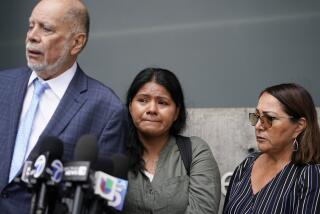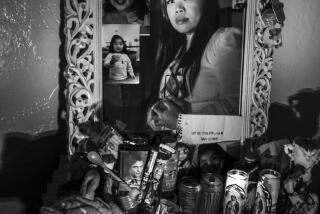After drug scare, no easy answers for depressed kids
- Share via
When Janna Tennant’s 13-year-old son was hospitalized for depression last spring, the news media already were rife with stories about a possible link between antidepressant use in youths and an increased risk of suicide.
“I remember questioning the psychiatrist at the time about the safety of starting him on Zoloft,” an antidepressant, says Tennant, who lives in Mission Viejo. “The doctors didn’t think it would be a problem whatsoever.”
For a time, the teenager’s mood disorder appeared to improve. But after he stopped taking the medication for five days, then resumed it, he became irritable, aggressive and stubborn, Tennant says. She took him off the medication and instead sent her son to counseling, encouraging him to exercise more and eat a healthier diet.
The experience not only made her question her doctor’s advice, she says, but also “gave me pause about the safety of the drugs.”
Like Tennant, a growing number of parents, and some doctors, appear increasingly uneasy with antidepressants for treating childhood depression. Six months ago, the Food and Drug Administration voted to affix a black box warning -- the most stringent safety warning -- to SSRI antidepressants prescribed for children based on studies linking the drugs to a slight increase in suicidal behavior. SSRIs (or serotonin reuptake inhibitors) are a class of medications that include Prozac, Zoloft, Paxil and others.
The number of prescriptions for antidepressants for children younger than 18 dropped 10% last year, according to data from Medco Health Solutions, a national firm that manages pharmacy benefit programs for employers. The decline is striking considering that antidepressant use by children had been rising sharply. From 1998 to 2002, prescriptions for kids had increased by 49%.
Some health officials express concern that the public has overreacted to the FDA decision and that some children who might benefit from antidepressants will not use them. Several mental health organizations have been revamping their websites and publishing brochures and guides to help families sort out the facts on treatment for childhood depression.
“Parents and physicians are being particularly cautious about the use of these medications, which in many cases is entirely appropriate,” says Dr. David Fassler, a child and adolescent psychiatrist in Burlington, Vt., and a spokesman for the American Psychiatric Assn. “But I do worry that some parents may be frightened and confused by the numerous media reports and may be reluctant to seek help for their children with psychiatric disorders. There are very significant risks of not treating an illness like depression.”
The FDA action came after health officials last September held a two-day hearing to examine evidence from clinical trials involving more than 4,000 children who took either an antidepressant or a placebo. The analysis showed no suicides in either group. Two out of 100 kids on placebo demonstrated suicidal thinking, compared with 4 out of 100 kids taking antidepressants.
Following an advisory panel recommendation, the FDA ordered the black box warning in October. Some panel members voted against the warning, however, noting that the studies followed the subjects for a relatively short period and only included children in clinical trials.
“They put a stop sign in front of the decision to use SSRIs,” says Dr. Ken Duckworth, medical director for the National Alliance for the Mentally Ill. “Pediatricians are more anxious about prescribing them, and families are thinking twice about going there.”
It’s understandable why parents might be confused about the antidepressant issue. Few long-term studies have been done attesting to the safety and effectiveness of SSRI antidepressants for children younger than 18. It is also difficult to weigh the benefits of drug therapy against the highly publicized risk of suicidal thinking. Prozac is the only drug approved for childhood depression, although other SSRIs are routinely prescribed for kids.
“Families end up in a terrible quandary having to do the risk-benefit analysis themselves in the absence of so little data,” says Gail Griffith, a Washington, D.C., mother whose son, Will, attempted suicide while taking antidepressants in 2001.
“I believe the drugs are both effective and valuable,” says Griffith, who was a parent representative to the FDA advisory board. “But I will never know whether or not they caused or increased his suicidal thinking. I’m lucky he survived.”
Griffith’s son gradually regained his health on a combination of therapies that included antidepressants.
Some health experts contend that the drop in antidepressant use by children could represent a more thoughtful approach to medications, some of which may have been prescribed cavalierly to children who were not properly diagnosed or monitored carefully thereafter.
The decline in prescriptions “shows that when physicians and parents are informed with accurate information they make informed decisions,” says Vera Hassner Sharav of the Alliance for Human Research Protection, a group that works to protect human research subjects. The group is not anti-medication or anti-psychiatry, she says. “But you would like to see evidence that these drugs have been shown to be beneficial in children.”
The black box warning could be useful if it leads to more careful diagnosing of children, says Sheila McDonald, board vice president of the Child & Adolescent Bipolar Foundation, an advocacy group that lobbied for the warning. Antidepressants prescribed to a child who has bipolar disorder, but who has been improperly diagnosed with depression, can worsen the disease. With bipolar disorder, depression alternates with bouts of mania.
The debate has also left pediatricians and other primary care doctors in a quandary, says Dr. Anette Johnson, an Orange County pediatrician. Because of a nationwide shortage of child and adolescent psychiatrists, many families must seek help from their primary care provider. Those doctors typically don’t have enough time or expertise for mental health care, she says. And some health insurance plans only cover medications, while restricting psychotherapy.
“Ten minutes isn’t long enough to make a fair and honest assessment of whether a teen is bipolar or depressed or is in early psychosis,” she says. “It’s hard to expect primary care providers to be psychiatrists. And as soon as you have this black box warning, most pediatricians will defer.”
*
(BEGIN TEXT OF INFOBOX)
Where to turn for help online
Parents of children with depression can obtain information on antidepressants and other treatment options from these organizations:
The Food and Drug Administration has published a resource manual: “Medication Guide: About Using Antidepressants in Children and Teenagers.” www.fda.gov.
Information on bipolar disorder in children and teens is available from the Child & Adolescent Bipolar Foundation. www.bpkids.org.
ParentsMedGuide is a website founded by medical and patient advocacy groups, including the American Psychiatric Assn. and the American Academy of Child & Adolescent Psychiatry. The site includes a fact sheet called “The Use of Medication in Treating Childhood and Adolescent Depression: Information for Patients and Families.” www.parentsmedguide.org.
More to Read
Sign up for Essential California
The most important California stories and recommendations in your inbox every morning.
You may occasionally receive promotional content from the Los Angeles Times.










